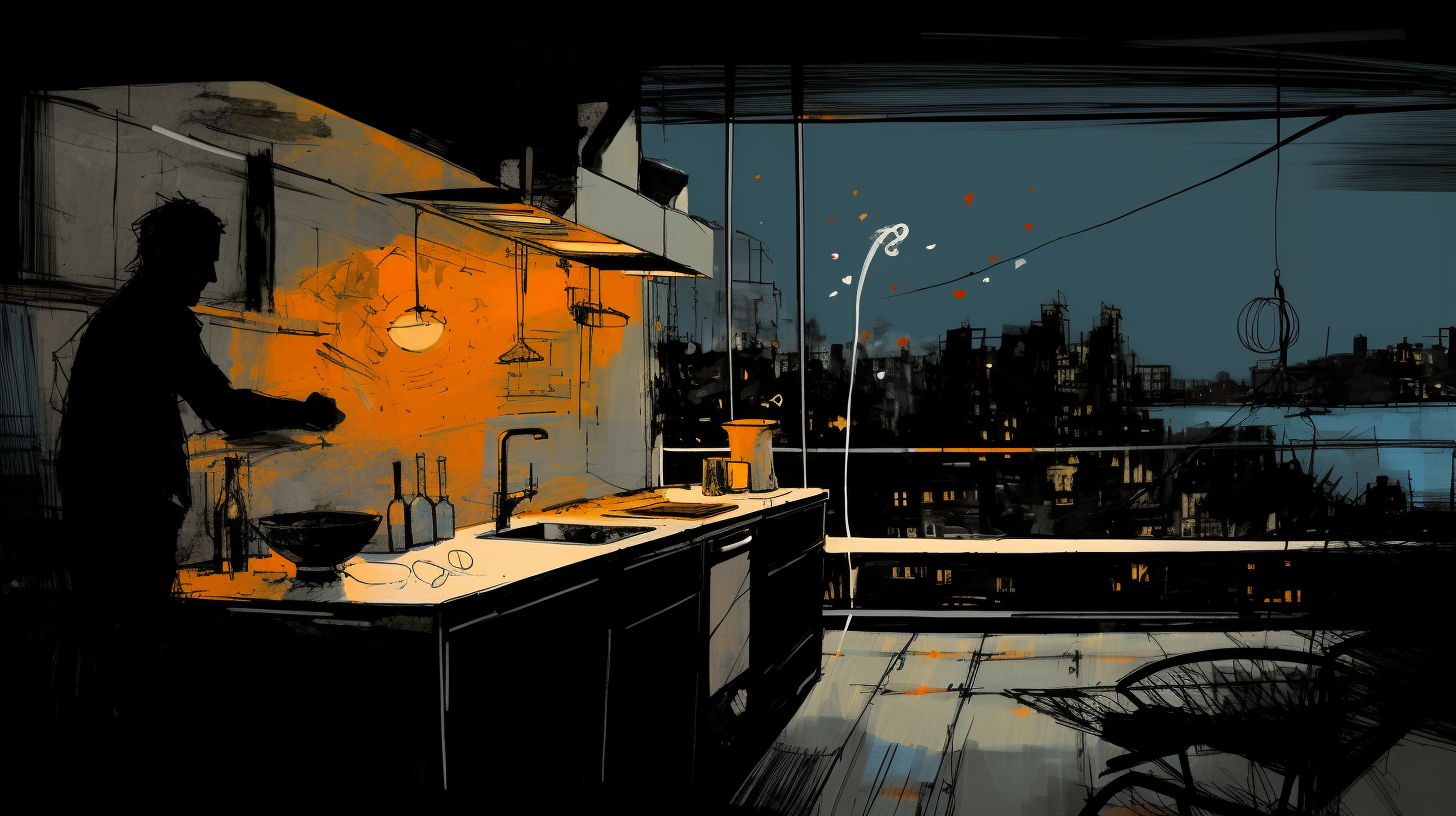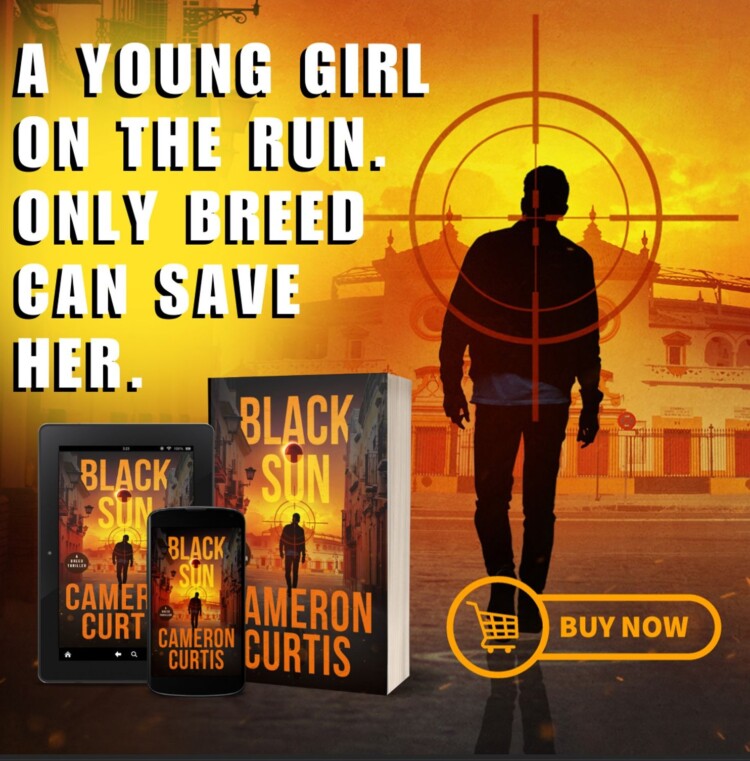There’s a carving board and a block of knives. I draw the carving knife and examine it. Solingen steel, eight inches long, full tang. The thin blade suits me fine. I wish it had a guard, but you can’t always get what you want.
A set of frying pans hangs from hooks on the wall. Looks like they’ve never been used. I pick up the biggest one. It’s eight inches across, weighs three or four pounds. I take the frying pan and carving knife back into the sitting room.
SOCP—Special Operations Combatives Program—is a course in close-quarters combat for assaulters. They teach you to use ordinary, everyday contents of a house to channel adversaries down fatal funnels. When men enter a room, they tend to step around furniture. They don’t think twice. Like a minefield, we use furniture to create area control obstacles.
As assaulters, when we enter a room, we ignore obstacles presented by furniture. If a sofa is in your way, go over it instead of around. The point is, we’re trained to see a room differently. We move the way we want to, not the way the enemy wants us to.
I drag the sofa closer to the front door so it obstructs the most direct path to the big picture windows. Rearrange the side tables and chairs. One side chair obstructs the path to the kitchen. I place the other so it leaves the way clear to the bedroom.
I stand at the front door and close the lights. The sitting room and kitchen are dark. The room is illuminated only by the sky outside and the sparkling lights of Arles. To the left, a narrow beam of light is visible under the bedroom door. Satisfied, I go to the dining room table and pick up one of the straight-backed chairs. Carry it to the front door.
The door opens inward to the right. I set the chair on that side, back to the wall. Make myself comfortable, settle in to wait.
My mobile phone buzzes. It’s Rincón.
“Alvaro says two men are on their way up,” the matador says. “They bribed the desk clerk for my suite number.”
“Thanks.”
“Do you need help?”
“No, stay with the girl. Whatever happens, don’t leave the room.”
I pocket the phone, get to my feet, and stand with my back to the wall. I carry the carving knife in my left hand, blade up. Hold the frying pan in my right hand, bottom facing away from me. Take a deep breath.
The men are quiet when they come. They push a flat metal strip between the door jamb and the door. Slide a heavy flat-head screwdriver in next to it, force the lock. The door opens and they enter the darkened room. They hold their weapons the way actors do in the movies. Weaver grips with bent elbows. First, one man enters, then the other.
The light beneath the bedroom door beckons. They sweep the sitting room and kitchen. A cursory sweep. They’re more interested in the bedroom. The first man stumbles against the back of the sofa. It’s three feet closer to the front door than one would expect. Clumsy, he steps left and advances on the bedroom. The number two man follows. They’re dark shapes, silhouetted against the picture windows.

Their eyes haven’t adapted to the darkness. I take a breath, step forward, and swing the frying pan backhand in a flat arc. Its solid edge smashes into the back of the number two man’s neck. There’s a whack, and the blow crushes his fourth and fifth cervical vertebrae. The man crumples like a sack of potatoes.
Confused, the first man whirls on me. From my point of view, he’s a silhouetted target. All he sees before his eyes is a black curtain. In a heartbeat, his face encounters the flat of the pan with a loud clang. The human head weighs eight pounds and I belted one with a four-pound steel tennis racket. The vibration from the impact runs straight to my elbow.
The man staggers. Without changing my grip, I chop the edge of the pan against the wrist of his gun hand. The long bones—radius and ulna—snap and he drops his pistol. The man rocks like one of those weighted punching bags that won’t stay down.
I swing the weapon again, this time in a horizontal arc. Crack the edge of the pan against the bridge of his nose. There’s a liquid snort as blood explodes from his nostrils. He lands flat on his back, unconscious.
Had I wanted to kill him, I would have struck his throat.
I separate the man from his weapons system. Pick up the guns, turn on the lights.
The pistols look like Colt 1911s, but they’re Spanish Modelo BMs. Eight-round magazines, 9mm Parabellum. Respectable weapons with a high rate of fire, but low capacity. They’re accurate at close range. Spanish service pistols, they’ve also seen combat with the Rhodesian and South African armies. I toss one on the sofa along with the frying pan. Safety the other and squeeze it into my waistband.
I turn and check out the damage.
One man’s dead with a broken neck. The other is laid out on his back. His face is a mass of blood from the eyes down. His mouth is open. I stoop and listen to him gurgle. The airway’s clear, he’ll live. For a while.
I whip out the power cord and bind his wrists. Drag him by the ankles, plant the straight-backed chair over his chest with the back toward his face. I stroll to the kitchen, fill a glass with water, and carry it into the sitting room.
Pick up a sofa cushion, stick the carving knife into it. Sit down on the wooden chair with my arms across the top rail. Lay the knife and cushion on the floor. I look down on the unconscious man and slowly pour water on his face. He coughs and sputters. Finds himself immobilized. His legs are free to kick, but with the chair planted on his chest, and me on top, he isn’t going anywhere.
“Who are you working for?” I ask.
The man coughs some more. Shakes his head. I draw the knife from the cushion and hold the point to his throat. “I said… who are you working for?”
“No habla Ingles.”
“Wrong answer.” I take out my phone, and open the translator app. “¿Para quién estás trabajando?”
The man struggles, tries to shout. I plant the cushion on his face. He drums his heels on the floor. When he lies quiet, I lift the cushion off. Push the point of the knife into his throat, deep enough to draw blood.
“Digame. ¿Para quién estás trabajando?”
He’s choking. The blood from his smashed nose is running down his trachea. Young guy, late twenties. They start them early in Spain. He coughs, manages to blubber the words, “El Vasco.”
“Leandro?”
“No, no. El Vasco.”
“Say again. Otra vez.”
The boy is weeping. “El Vasco. Déjame vivir. Amor de dios.”
That sounds like a good answer. I take out my phone and translate “El Vasco.”
The Basque.
I shove the cushion onto the boy’s face and press the muzzle of the Model BM against it. Not too firmly, I don’t want to push the weapon out of battery. The cushion muffles the shots.
Now, the bearded man has a name.
—
Want to read the rest of the book? It is available now on Amazon.










COMMENTS